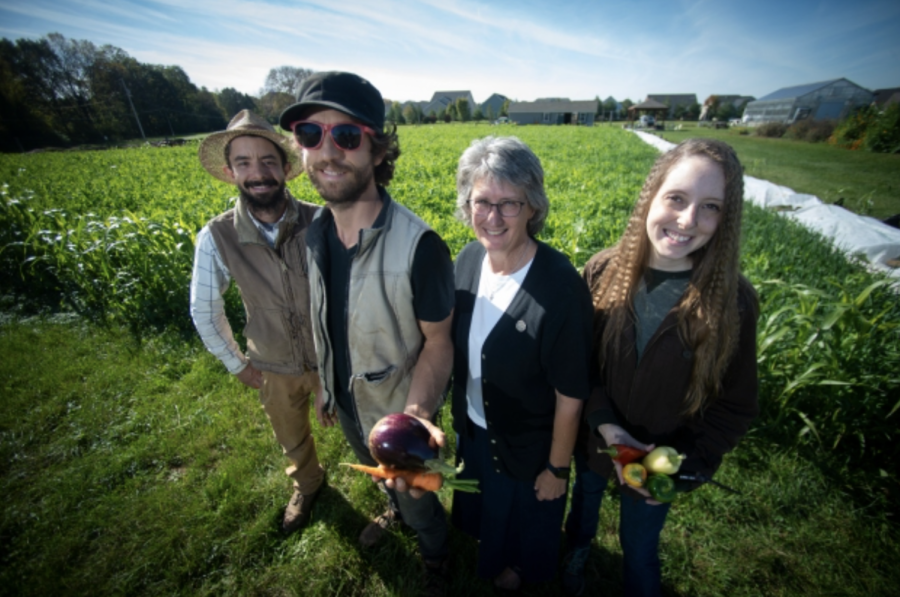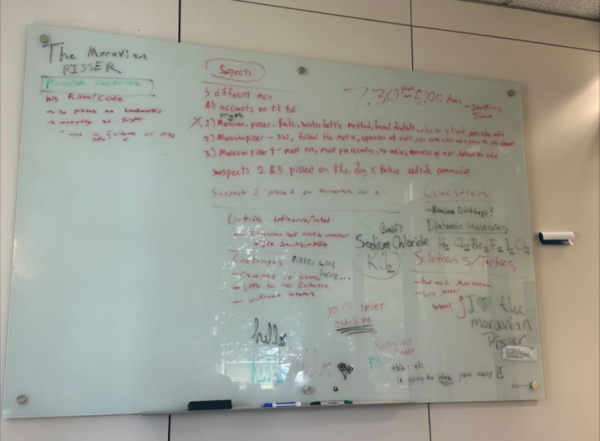Moravian’s Farm Away From Home: The Monocacy Farm Project
Moravian students seeking an eco-friendly, volunteer-reliant source of nutrient-dense vegetables need look no further than the Monocacy Farm Project, a community-supported nonprofit organization less than five miles from campus.
The Monocacy Farm Project was started by the Sisters of Saint Francis. In the 1940s, this local group of Catholic nuns who follow the Pope’s declarations to care for creation and community began following that direction in the Lehigh Valley.
The Sisters’ mission eventually led them in 2013 to establish the Monocacy Farm Project. This year, the Project is coming up on its 10th anniversary.
Today, both Sister Bonnie (middle right), the executive director of the farm, and Amy Barringer (far right), the events coordinator, help the two full-time farmers, Anton Shannon (far left) and Eli Stogsdill (middle left), manage the farm. Along with the board of directors, this team supports almost all that the farm does.
Community buy-in is essential to help support the farm. To that end, the MFP hosts a Pick Your Own program.
Twice a week, every Wednesday and Saturday, the farm invites everyone to come harvest any of the crops and leave a contribution for whatever they take. A $10 membership fee covers their first harvest.
The Pick Your Own initiative is in its fourth season, and growing at an exponential rate. Local participants anxiously anticipate the harvesting season, which lasts from mid-April until the weather becomes too cold to support crops.
The spring equinox has just passed, so the first round of vegetables will soon be available. Peas, spinach, garlic, and lettuce are all planted in the field. In the greenhouse, workers have also planted lettuce, parsley, scallion, onion, cabbage, pepper, and flower seeds, all awaiting proper weather conditions to be moved to the soil.
In two weeks, tomatoes and eggplants will be ready for planting. Mid-May is generally the frost-free date for crops like tomatoes, eggplants, and peppers, so the Farm will be offering those soon.
Towards Mother’s Day, flowers will be offered in a wide variety of shapes, sizes, and species. Participants may pick their own flowers and take them home in biodegradable pots.
With their time and resources, Monocacy Farm Project supports local organizations, such as the Monocacy Creek Watershed Association, an environmental organization supporting green infrastructure and smart development, and Second Harvest, a governmental non-profit foodbank, with their herbs and veggies every week.
Located at 395 Bridle Path Road, in Bethlehem, the farm spans about 2 acres and yields several tons of produce every season. People are tempted to look at this total weight to quantify the success of the farm. For Stogsdill, however, success is measured in the healthiness of the vegetables the farms grows.
“We are really working on growing nutrient-dense, high-quality produce. If we want to get the most weight, we could grow heavy [crops],” he said. ‘”But growing herbs and lettuce and lighter foods that are most appropriate for small growing operations is actually a lot of what is missing from the emergency food system.”
Not only do these herbs and veggies find their way into the Emergency Food System, but they appear in Mo’s Cupboard, as well. Located just inside Student Life in the basement of the HUB, Mo’s Cupboard acts as the student food and resource pantry for all Moravian students.
Mo’s Cupboard, much like the Monocacy Farm Project itself, is a fully community-supported resource; it does not receive any funding from Moravian. Instead, Mo’s relies on monetary and resource donations, grants, and food drives.
Mo’s Cupboard stocks everything from hummus to ramen to marshmallows. The majority of items stocked in Mo’s are either donations from The Factory, in the form of Pipcorn and Honey Stingers, or various food items bought from Second Harvest.
Last fall, the Monocacy Farm Project began adding its fresh produce to Mo’s fridge, including tomatoes, peppers, jalapeños, and heads of lettuce (to name just a few).
In the proper cooling conditions, these vegetables last one week and some even longer. The vegetables at Mo’s Cupboard rarely saw this expiration date; they were mostly taken within the first couple of days of stocking.
The workers of Mo’s Cupboard believe in minimal direct handling of any consumables, to prevent any cross-contamination. So, the veggies move right from farm to bag to fridge.
Some students may feel intimidated about taking the farm’s fresh produce because they do not feel they need it more than others. In-Chi Chow-Rivera, executive administrative assistant of Student Life, wants all members of the Moravian community to feel welcome using this on-campus resource.
“We are not trying to sell anything,” she said. “We are trying to fulfill as many needs as possible.” Truly, if you need it, take it.
Note: If you or someone you know is in need of vegetables, or any other resource, reach out at: [email protected].
The Monocacy Farm Project encourages volunteers of all backgrounds to help, learn, and contribute. Moravian volunteers have seeded, planted, and transported vegetables from their field, and they are looking for more volunteers to help support them. If you are interested, you can visit their website or email [email protected]







